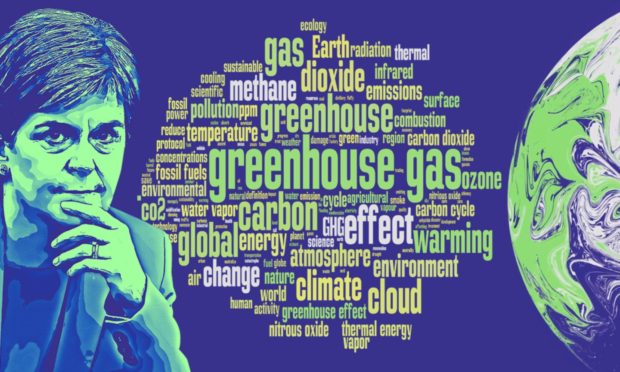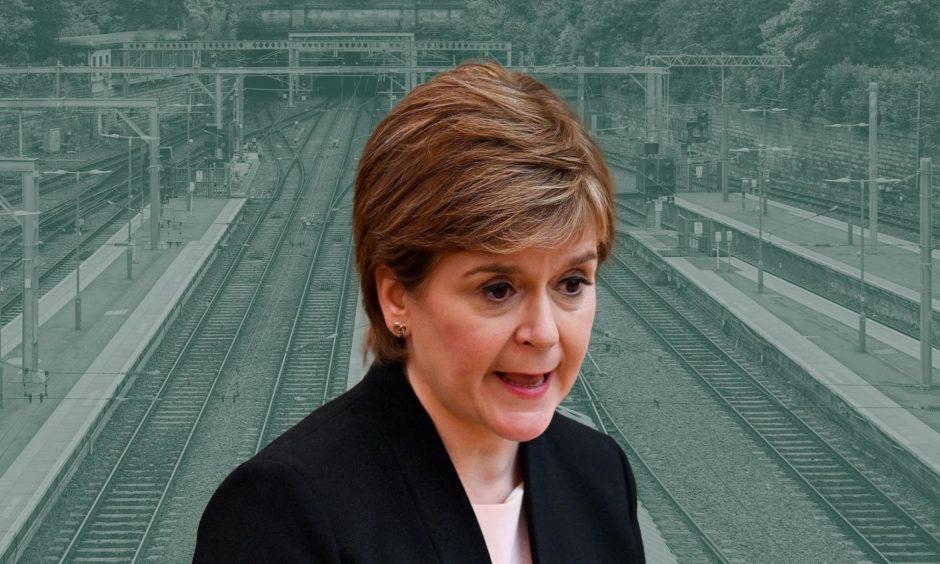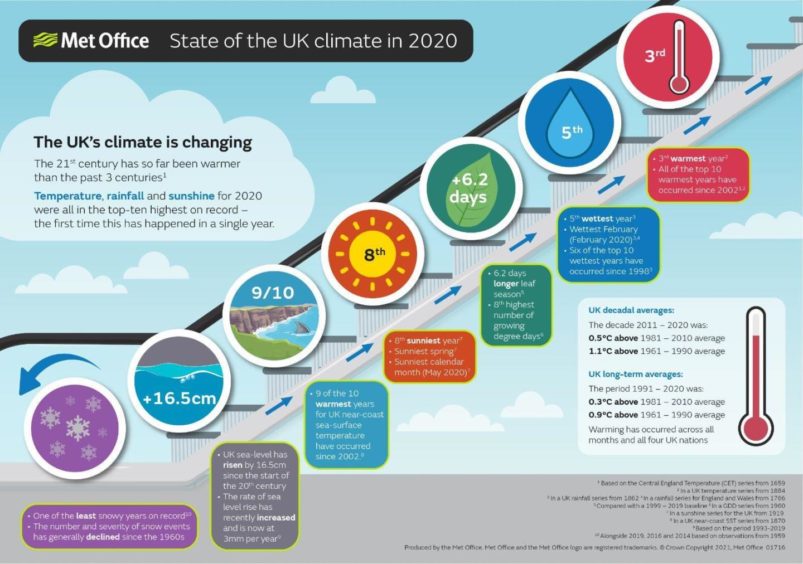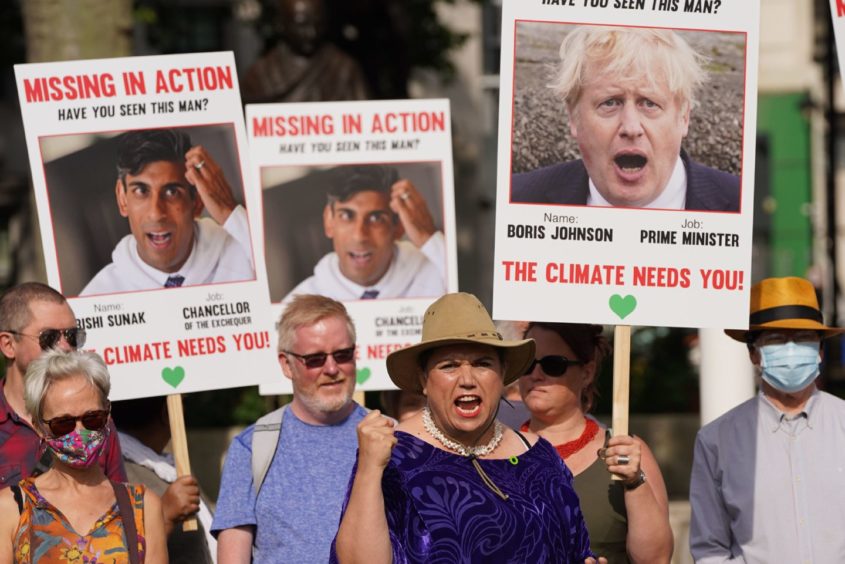Scotland will take centre stage later this year as Glasgow hosts the COP26 UN Climate Change Conference.
The issue has been put under fresh spotlight after a landmark UN report found it was “unequivocal” human activity is responsible for global warming and that “widespread and rapid changes” have already occurred in every inhabited region across the globe.
It warned many of these changes are irreversible within our lifetimes.
The climate crisis is also playing out across our domestic politics with Nicola Sturgeon calling this week on the UK Government to “reassess” oil and gas licences already issued – including the controversial Cambo development near Shetland.
The first minister had previously stopped short of unequivocally opposing the proposed development, despite being confronted by protesters while visiting the Govanhill Carnival in her Glasgow Southside constituency on Saturday.
WATCH: We and @StopCambo just challenged @theSNP leader @NicolaSturgeon on her refusal to stop the Cambo North Sea oil field.
Big corporations profit from dirty energy and politicians like Nicola Sturgeon let them get away with it.
We’re here to put a stop to that. ✊ pic.twitter.com/Q3ilmhkA3C
— Green New Deal Rising (@GNDRising) August 7, 2021
Meanwhile, the SNP and Scottish Greens entered protracted coalition negotiations after May’s Holyrood election that could see the latter enter government for the first time in Scotland.
Front and centre of those talks will be the environment, with the climate change emergency putting the future of oil and gas firmly on the agenda and potentially impacting thousands of Scottish jobs.
Some politicians, such as West Aberdeenshire and Kincardine MP Andrew Bowie, say it is better to extract the oil the UK needs from its own waters – a net zero basin – rather than the middle east or Russia.
However others, such as Scottish Labour’s net zero spokeswoman Monica Lennon, have called for Nicola Sturgeon to use her “voice and influence” to oppose sites like Cambo and to deliver a just transition to a green economy.
With the clock ticking down until the world descends on Scotland for COP26, the actions – and failures – of the Scottish Government will be under more scrutiny than ever before.
Broken promises
Political opponents have accused the Scottish Government of a series of broken promises on the environment and climate change, and it has repeatedly failed to meet its own emissions targets.
The SNP pledged in 2016 to have the first low emission zone – local schemes to improve air quality in towns and cities – in place by 2018 but delays in enacting the Transport Act means the first of these will now not be finished until next year.
Nicola Sturgeon announced in October 2017 that the Scottish Government would create a publicly-owned energy company before the end of the last parliament.
An independent strategic outline case was published the following year to consider how the public energy company could be developed and suggested a phased approach. The process has not yet moved beyond the business case stage.
After eight rounds of funding, the Scottish Government has supported the purchase of 532 low emission buses but opponents have pointed out this is equivalent to just 12% of Scotland’s total fleet.
Continuing at the same rate, it would take 65 years before all of Scotland’s buses are low emission. Meanwhile, passenger numbers have fallen by 25% since 2007, with many local routes disappearing.
Cycling targets have also been missed. Ministers pledged that 10% of all journeys would be being made by bicycle by 2020 but this has been stuck at 1% for the last decade, and between 2009 and 2019 active travel and transport actually decreased.
Funding has been slashed for major environment bodies such as SEPA and and SNH and despite a promised 130,00 green jobs by 2020, the number of people directly employed actually fell to 21,400, according to the STUC.
With COP26 fast approaching, campaigners will hope the current package of promises can be met.
What has been pledged
The Scottish Government has set a target date for net-zero emissions of all greenhouse gases by 2045, with interim targets of 75% by 2030 and 90% by 2040.
It is not currently on track to deliver these targets after failing to meet the annual targets for 2018 and 2019.
The 2045 target, which is five years ahead of the UK Government’s target, is based on what the independent Committee on Climate Change advise is the limit of what can currently be achieved.
The 2030 target was beefed up last year after MSPs agreed a pledge to cut 66% of emissions from 1990 levels did not go far enough.
An updated climate change plan published in December contained a host of policies including reducing car use, phasing out petrol and diesel cars and vans, and an ambition for Scotland to become “the world’s first zero emission aviation region” – with a pledge to decarbonise scheduled flights by 2040.
It also included a £180 million emerging energy technologies fund which will support the development of Scotland’s hydrogen and carbon capture and storage industries over the next five years – as well as support development of negative emissions technologies.
The 2019 Climate Change Act embeds the principles of a ‘just transition’, which means reducing emissions in a way that tackles inequality and promotes fair work.
As part of this a just transition commission was set up to provide independent advice to the Scottish Government, alongside the UK-wide Committee on Climate Change, and a citizen’s assembly of more than 100 people.
Last month Scotland became the first government that is not a formal party to the Paris Agreement to publish an indicative ‘nationally determined contribution’ (NDC) – a type of international pledge – to prevent global warming of more than 1.5 degrees.
The UK Government published a UK-wide NDC in December 2020.
Does the plan go far enough?
When annual statistics revealed ministers had missed the emissions target for 2018, Roseanna Cunningham – who was then the environment secretary – said the bar had “intentionally been set to provide an extremely stretching pathway to net zero”.
However, environmental campaigners raised concerns when the updated climate plan was published last year that “get out of jail free card” technologies are being used as a smokescreen for failures to reduce emissions.
Speaking at the time, Fabrice Leveque, head of policy at WWF Scotland, said the plan “falls short of delivering some of the big decisions needed to truly respond to climate change as an emergency”.
“Detail on the actions required by the farming sector is lacking, and the earlier date of 2035 to bring all homes to a good standard of energy efficiency is still five years later than we need to help that industry grow today,” he said.
“This is not the pace of action required by the climate emergency.”
Friends of the Earth Scotland’s climate campaigner, Jess Cowell, said that while there were welcome policy improvements, there were also “very real doubts that this plan, as a whole, will actually deliver on these commitments”.
“Towards the end of this decade, the plan relies heavily on illusory promises of carbon capture, hydrogen from gas and hare-brained schemes to burn trees for energy,” she said last year.
“There is a very real concern that negative emission technologies are being used as a ‘get out of jail free’ card by the Government to make their figures add up rather than doing the hard work of cutting emissions in the here and now.”



